
views
Selecting a Supplement Type and Dosage

Determine your appropriate calcium supplement dosage. Make an appointment with your doctor to evaluate your calcium levels. You'll need to talk with your doctor about your diet, so that they can estimate how much calcium you intake already. You may also need to get a blood test to check your current calcium levels. It's important that your total daily calcium intake stays below the suggested limit, which is based on both sex and age. Too much calcium can cause a variety of health problems, including an increased risk for heart disease. For men ages 19-50 years old, the maximum daily allowance is 2,500 mg. For men 51-70 years of age, the allowance is 2,000 mg. For men 71 years old and older, the allowance is 1,200 mg. For women 19-50 years of age, the allowance is 2,500 mg. For women 51 years old and older, the allowance is 2,000 mg. For children younger than 6 months, the daily allowance is 200 mg. For children between 6-12 months of age, the daily allowance is 260 mg. For children between 1-3 years, the allowance is 700 mg. For children between 4-8 years, the allowance is 1,000 mg. For children between 9-18 years of age, the daily allowance is 1,300 mg.
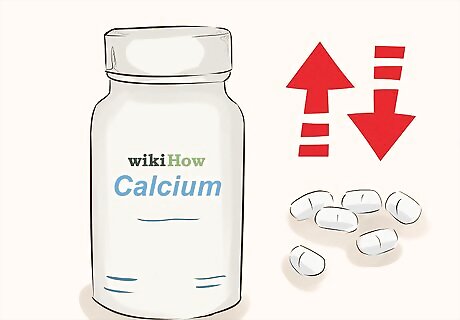
Adjust your supplement dosage as needed. Your doctor can monitor your calcium level with a blood test at each check-up. The results will give you an indication as to whether or not you need to raise or lower your calcium supplement dosage. Health factors, such as taking corticosteroids, can also lower your body’s ability to absorb calcium supplements and must be considered as well when creating a dosage plan. If you are vegan, are lactose-intolerant, or have osteoporosis, then your body may not absorb calcium at the usual rate. This may mean that you’ll need to start with a higher calcium supplement dosage. If you have a protein-based diet, this can also cause your body to absorb calcium more slowly and excrete more of it as well.

Check the label for the actual amount of calcium in each supplement. All supplements contain differing levels of elemental calcium. Since this is the type of calcium that actually absorbs into your body, it’s important to choose a supplement with enough to suit your needs. Look for this information on the supplement facts label on the back of the bottle. For example, your calcium carbonate supplement might contain 450 mg of elemental calcium.

Look for a supplement with outside testing approval. Supplements are not regulated in the same way that other drugs or foods are. This means that it’s important to choose a supplement that has undergone independent quality testing by NSF International (NSF), the U.S. Pharmacopeial Convention (USP), or another agency. This testing information should be clearly listed on the supplement itself or on the manufacturer’s website. Testing will also help to ensure that you get a uniform product each time that you purchase it. Otherwise, you could experience differences in dosage or purity. The “NSF” in NSF International stands for “National Sanitation Foundation.”

Get plenty of calcium from your diet in addition to supplementation. Although supplements are a quick, effective way to boost your calcium levels, it’s always best to eat a nutrient-rich diet. Incorporate foods that are naturally high in calcium, such as soft-boned fish, into your diet along with calcium-fortified products, such as milk or orange juice. Many vegetables are also high in calcium minerals—especially leafy greens. Some cereals, soy products, and juices are also fortified with extra calcium. Their ingredient labels usually note this under calcium percentages. To track the calcium in your diet, you can download an app. The Calcium Calculator app offered by the International Osteoporosis Foundation is one option. This helps to ensure that you don’t exceed the daily maximum recommended amounts of calcium. If you're eating a healthy diet, you likely won't need a calcium supplement at all.
Staying Healthy While Taking Supplements

Discuss possible drug interactions with your doctor. A calcium supplement can lower the effectiveness of other certain medications. It may also prompt negative side effects, such as stomach upset. Before you begin any supplementation routine, make an appointment with your doctor to evaluate all of the possible interactions. For example, if you need to take a total of 750 mg a day, go ahead and split it into a first dosage of 250 mg and a second one of 500 mg. Dividing your supplements in this way will help to reduce any possible side effects. Antibiotics, blood pressure medications, thyroid medications, and bisphosphonates can all interact negatively with calcium supplements. In particular, calcium supplements can interfere with your ability to absorb antibiotics.

Switch supplements if you experience digestive upset. The combination of nutrients and chemicals in certain calcium supplements can cause you to feel bloated, constipated, or just generally gassy. If these symptoms linger beyond a few days, then it may be worthwhile to try another brand or type of calcium supplement. Try taking a low dose of a form of calcium that's more easily available to your body, like calcium citrate or calcium lactate.
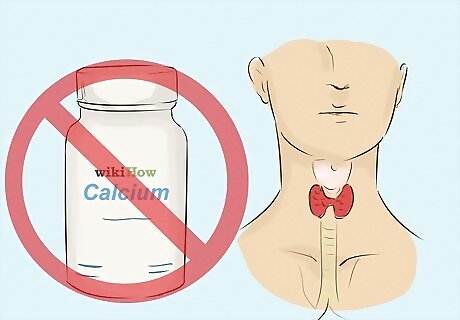
Avoid calcium supplements if you suffer from hypercalcemia. This is a condition that naturally boosts the calcium levels in your bloodstream. Even if you are treating your hypercalcemia, taking supplements can cause your calcium numbers to go beyond safe limits. Talk with your doctor about healthy ways to correct your calcium levels.
Sticking with a Dosing Routine
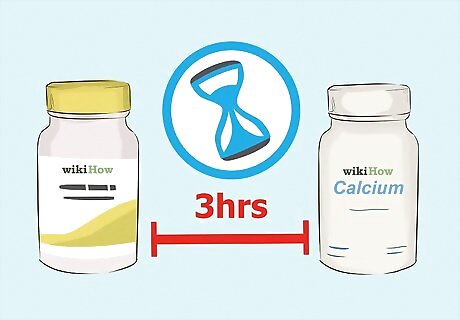
Take your calcium supplements at least 3 hours apart from other medications. To minimize any possible interactions with other drugs, create a schedule that puts as many hours as possible between them. This could mean taking other medications in the morning and your calcium supplement in the evening or vice versa. When this isn’t possible, even putting 3 hours between them can lessen the possibility of side effects. Experiment with what schedule works for you and your lifestyle. Once you find one that works, consistently is key.
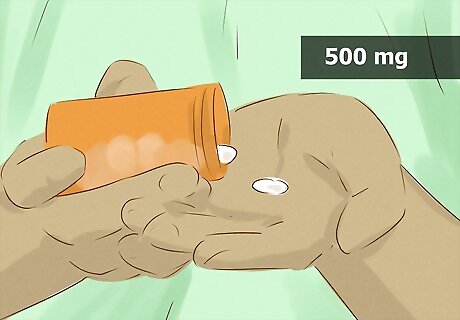
Divide your total dosage into 500 mg amounts. Your body can only absorb a limited amount of calcium at a single time. For that reason, it can help to take multiple small doses throughout the day instead of a large one. Take your doses at least 3 hours apart to maximize absorbency and minimize any side effects. For example, if you need to take a total of 750 mg a day, go ahead and split it into a first dosage of 250 mg and a second one of 500 mg.

Ingest your supplements with or without meals as directed. Some calcium supplements are less likely to produce side effects if you have a full stomach. Others only require a light snack or no food at all. Look at the back of your supplement’s label for instructions on how to take it. Or, talk with your pharmacist or doctor to see what they suggest.
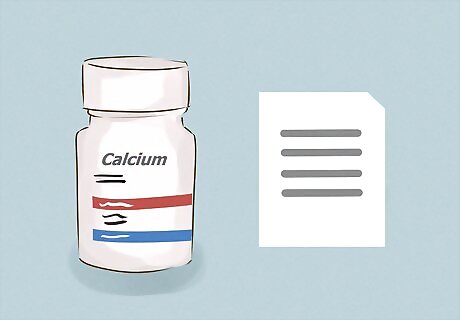
Follow the label’s directions on whether to chew the medication or not. Most calcium supplements come in tablet or pill form. Chewable supplements require that you chew them in order to help with absorption. Other types of calcium supplements direct you to swallow them whole while drinking a glass of water. It’s generally best to take your medication with water. Acidic drinks, such as juice, can lower the supplement’s effectiveness.

Stay hydrated. Aim to get at least 15.5 cups (3.7 L) of fluids each day if you are a man and 11.5 cups (2.7 L) if you are a woman. These fluids can come from both dietary and liquid sources. Being well hydrated is important because calcium supplements can sometimes cause constipation. The old guideline of drinking at least 8 glasses of water each day is generally a good idea. You can also try to boost your fluid levels by drinking tea, juice, or other beverages. For example, drinking water is a great liquid source of hydration. In contrast, grapes are a good way to get hydration from a dietary source.


















Comments
0 comment